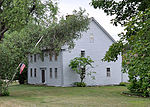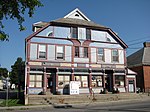Mountain Meadow Preserve
Mountain Meadow Preserve is a 180-acre (73 ha) open space preserve located in the Berkshires and Green Mountains of northwest Massachusetts and adjacent Vermont in the towns of Williamstown and Pownal. The property, acquired in 1998 by the land conservation non-profit organization The Trustees of Reservations, includes highland meadows, wetlands, forested hills, and 4 miles (6.4 km) of trails.Located on Mason Hill (a sub-peak of The Dome), the preserve is open to hiking, cross-country skiing, and similar passive pursuits. Views from the property include Mount Greylock and the Taconic Mountains to the west. Trailheads are located on Mason Road in Williamstown and White Oaks Road in Pownal.
Excerpt from the Wikipedia article Mountain Meadow Preserve (License: CC BY-SA 3.0, Authors).Mountain Meadow Preserve
Niles Trail,
Geographical coordinates (GPS) Address Nearby Places Show on map
Geographical coordinates (GPS)
| Latitude | Longitude |
|---|---|
| N 42.73853 ° | E -73.20756 ° |
Address
Mountain Meadows Preserve Williamstown Parking
Niles Trail
01267
Massachusetts, United States
Open on Google Maps








